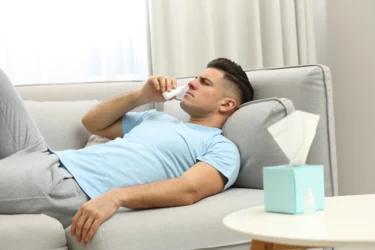What Causes Dry Nose at Night and What You Can Do About It
By Dr. Vishesh Bharucha +2 more

Get,

to manage your symptom
Get your,


4 Cr+ families
benefitted

OTP sent to 9988776655



You’ve successfully subscribed to receive
doctor-approved tips on
Whatsapp

Get ready to feel your best.

Hi There,
Download the PharmEasy App now!!


Register to Avail the Offer
Send OTPBy continuing, you agree with our Privacy Policy and Terms and Conditions

Hi There,
Sign up on PharmEasy now!!
Trusted by 4 crore+ families

OTP sent to 9988776655



You have unlocked 25% off on medicines




Code: NU25
By Dr. Vishesh Bharucha +2 more
Table of Contents
A dry nose is a common thing we may all have faced at some point in our lives, especially during the winter season when it may be caused by low humidity and indoor heating systems1. Yet, it becomes hard to deal with at night as it may cause irritation, crusting, or nasal obstruction, which may interfere with sleep. While it is not a universal problem, knowing what causes it gives you a way to manage it better.
In this article, you’ll understand the causes of a dry nose and discuss ways to manage it to reduce any discomfort. The article will also discuss warning signs that might mean you need medical help.

Dry nose may occur due to varied reasons, from simple environmental issues to serious health concerns. Let’s understand some common causes of dry nose.
If you don’t drink enough water, it may lead to dehydration. Dehydration, even when mild, may contribute to reduced mucus production2. This indirectly affects the moist nasal lining. Hydrating yourself is often the first step to managing a dry nose.
Changes in seasons often lead to dry air, especially in winter. The use of heaters or air conditioners can also reduce indoor humidity1. This adds to the dryness of the inner lining of the nose. Using a humidifier to keep your living space moist may help you avoid dryness of the nose.
Allergies can often lead to a dry nose3. Identifying and avoiding common allergy triggers like pollen, pet fur, dust mites, and moulds may save you from a lot of inconvenience.
Professional medical advice can guide you towards better alternatives for these medicines without causing dryness in your nostrils.
This is a condition characterised by dryness and atrophy (thinning) of the nasal mucosa, often accompanied by crusting and widened nasal air spaces. It is commonly associated with the symptom of a dry nose6.
Management involves identifying and eliminating contributing factors, moisturising the nasal mucosa, removing crusts, and treating any secondary infections.
Older adults are more likely to experience a dry nose due to lower humidity and temperature in the nasal passages. With age, blood vessels in the nasal lining become less effective at warming and moistening the air, leading to irritation, dryness, and crusting7.
There are several environmental triggers for a dry nose, as follows.
Steering clear of these triggers may give a lot of relief from a dry nose.
Nasal obstruction can result from conditions like a deviated septum, polyps, rhinitis, or sinusitis. It may lead to mouth breathing, causing dryness in the mouth and throat8. However, it does not directly cause nasal dryness.
Sjögren’s syndrome is a chronic autoimmune disease where the body attacks its exocrine glands (that secrete substances into body cavities or on the surface of the body), mainly the salivary and tear glands, causing dry eyes and mouth. It can also affect other mucosal surfaces, including the nose, throat, bronchi, and vagina, leading to widespread dryness9.
If you have severe or persistent nasal dryness, it’s important to consult a doctor to rule out Sjögren’s syndrome as a possible cause.
Some health issues, like empty nose syndrome (ENS) and rhinitis sicca anterior, might also cause a dry nose6. Managing these with professional advice from a doctor is the best way to address these issues.
Knowing the signs and symptoms of a dry nose may help you tackle it before it gets worse. Here are some common signs of a dry nose:
If you see one or more of these signs, you should consult a doctor for the right management options.
To my knowledge, an occasional case of dry nose may result in anosmia or the loss of smell. Additionally, you may get empty nose syndrome. Even though your nasal passageways are completely open, this condition may give you the impression that something is obstructing them. As such, even when your lungs are getting enough oxygen, you might have a persistent feeling of shortness of breath13.
Dr. Siddharth Gupta, B.A.M.S, M.D (Ayu)
Nasal dryness can often be managed with some simple steps, such as:

Drinking plenty of water supports overall hydration and general health. However, it is important to note that hydration alone doesn’t directly moisten the nasal mucosa, unless there’s significant dehydration.

Humidifiers are effective in maintaining humidity in dry indoor environments or during colder months.

Keeping your nose clean can help retain the moisture and reduce irritation or crusting. However, it’s important to avoid over-cleaning, as aggressive methods may further dry or irritate the nasal lining. Two common methods for maintaining nasal hygiene include11:

Saline sprays help moisturise the nasal mucosa and loosen mucus, which may ease mild congestion. Please note that they are not intended to treat more severe blockages caused by infection or structural issues.

This involves gently rinsing the nasal passages with a salt-water solution. It can help remove allergens, crusts, and mucus, keeping the sinuses clean and moist when done properly and regularly.

Identify the medicines or substances that dry your nose, and talk to a doctor about substituting them with something that suits you better.

Some nasal gels are specifically formulated for safe intranasal use and help moisturise the nasal passages and reduce irritation12.

Steam from hot water or a sauna may cut down nasal dryness by making your nasal mucosa moist.
In my opinion, the following actions may help reduce dry nose symptoms: use nasal sprays or drops to lubricate nasal passages as directed by your healthcare provider, use a humidifier to provide moisture to the air, and use a saltwater solution to rinse your nasal passages (nasal irrigation)13.
Dr. Rajeev Singh, BAMS
Certain medications can cause dryness in the nose as a side effect. Some commonly known contributors include:
While a dry nose can usually be managed at home, you should see a doctor if you notice any of the following signs:
Discussing these issues with your healthcare provider helps rule out serious causes and manage your dry nose better.
Having a dry nose at night can be quite annoying. However, knowing what might cause it helps you manage it better. Making sure that you drink enough water, using a humidifier, and taking care of basic nasal hygiene may be helpful in managing a dry nose at home.
However, you will need to keep an eye on your symptoms and consult your doctor if needed to enjoy good nasal health and peaceful sleep.
You may use a humidifier in your bedroom, stay hydrated all day, clean your nose, and apply just a bit of petroleum jelly inside your nostrils before bedtime to keep your nose from drying at night.
A dry nose may indicate many causes, such as dry indoor air, allergies, and certain drugs, or underlying health issues.
A dry nose may be caused by dry indoor air, drug allergies, or a health condition such as hormonal imbalance or Sjögren’s syndrome. Talk to a doctor to identify the cause of the dry nose.
Protect your nose from drying out at night by staying well-hydrated during the day, using a humidifier in your bedroom, applying saline nasal spray before bed, or applying a small amount of petroleum jelly inside your nostrils. Always consult a doctor before you try any new remedy.
Disclaimer: The information provided here is for educational/awareness purposes only and is not intended to be a substitute for medical treatment by a healthcare professional and should not be relied upon to diagnose or treat any medical condition. The reader should consult a registered medical practitioner to determine the appropriateness of the information and before consuming any medication. PharmEasy does not provide any guarantee or warranty (express or implied) regarding the accuracy, adequacy, completeness, legality, reliability or usefulness of the information; and disclaims any liability arising thereof.
Links and product recommendations in the information provided here are advertisements of third-party products available on the website. PharmEasy does not make any representation on the accuracy or suitability of such products/services. Advertisements do not influence the editorial decisions or content. The information in this blog is subject to change without notice. The authors and administrators reserve the right to modify, add, or remove content without notification. It is your responsibility to review this disclaimer regularly for any changes
Comments

Leave your comment...
You may also like
Comments